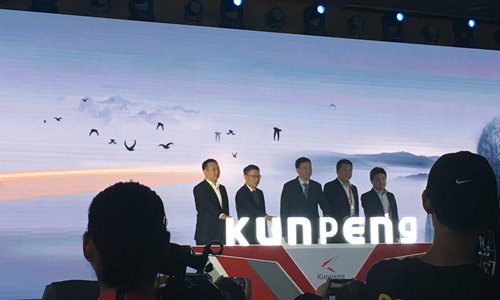HOME >> BUSINESS
Chinese cities scramble to implement Huawei ecosystem
By Xie Jun Source:Global Times Published: 2019/9/11 21:48:40

Huawei executives and government officials jointly launch the Kunpeng Industrial Ecosystem Center in Shanghai's Xuhui district. Photo: Wang Jiamei/GT
Local Chinese cities are scrambling to be homes to Huawei's Kunpeng industrial ecosystem, a phenomenon that shows Chinese local governments' eagerness and strong motivation to push economic transformation by ushering in new technologies, experts said.
Such eagerness has been intensified amid the US efforts to thwart Chinese high-tech firms' supply chains in the US.
On Tuesday, Huawei signed two cooperation framework agreements with Changsha in Central China's Hunan Province to cooperate in two areas: Huawei's Kunpeng computing industrial ecosystem and the intelligence connected automobile industrial ecosystem.
According to the agreement, Changsha will set up an innovation manufacturing base to promote the development of Kunpeng. A Kunpeng cloud service innovation center will also be established in Changsha, according to media reports.
During this year's Smart China Expo, Huawei also signed an agreement with Southwest China's Chongqing Municipality to jointly establish the Chongqing center for the Kunpeng computing industrial ecosystem, which will be located in Chongqing's micro-electronics industrial park, Xiyong.
According to a report by the Chongqing-based news portal cqrb.cn on September 2, the Chongqing center will promote construction of the Kunpeng computing industrial park as well as building an incubation platform for the Kunpeng Computing Industry.
Huawei has already launched its Kunpeng industrial ecosystem base and supercomputing center in Xiamen, East China's Fujian Province, which will provide computing services for local governments and major local State-owned enterprises using Huawei chips and operating systems.
Huawei launched its Advanced RISC Machine-based CPU, called Huawei Kunpeng 920, in January.
According to domestic media reports, Huawei plans to establish an industry ecosystem based on the Kunpeng CPU. It also plans to join hands with partners in the ecosystem to offer IT infrastructure and industrial applications to various industries, including big data platforms and cloud services.
Veteran telecommunications expert Xiang Ligang said that now many local governments have placed greater hopes on driving their local economies via technological industries, and many have taken action to attract high-tech companies.
Some have benefited from such efforts, such as Southwest China's Guizhou Province, Xiang said. Traditionally known as a relatively remote and underdeveloped region in China, it has achieved an economic leap by developing big data and other high-tech industries, he said.
Xiang also said that many traditional industries have side effects for the economy such as real estate bubbles or pollution, but that's less of a problem with high-tech industries.
"Particularly while the trade war lasts, the Chinese government has realized the importance of developing independent high technologies. This is also pushing local governments to speed up their high-tech industrial development, and Huawei with its business scale and influence is certainly a major attraction for them," Xiang said.
Posted in: COMPANIES